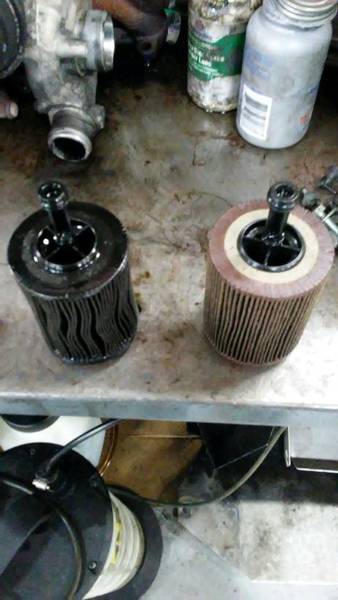Oh, the newbs....

Well first, let me welcome you to our little club. Glad to see a new name.

So let me try and help you understand some things, ok?
First, the 2012-2014 Beetle TDI (as sold here) left the factory
with the exact same CJAA engine as the same year Golf, Jetta, and Sportwagon.. And, perhaps for whimzy as to lend some fun to the nature of the vehicle, Volkswagen placed three "fun" little gauges atop the dashboard of these cars. A race timer, a boost gauge,
and an oil temp gauge. How about that? Yes, a CJAA engine left the factory with a gauge already installed as you are asking about!
Now, I do not know all the details behind this, but knowing VAG how I do, I can jump to the conclusion that some of the necessary bits to make this gauge work are already in your car's systems floating around somewhere, or at least the ports for the pins for the wires are present, and in many cases the necessary module(s) to make it work have this already in them, it just needs a coding change to "unlock" it. Like adding fog lamps, for example. I merely pointed this out, so that you could perhaps take a quick peak into how the Beetle with the CJAA engine does this, because I am *pretty sure* it is not simply little German fairies prancing about the CAN bus guessing as to the oil temps.

Second, you say "oil is oil", well that is not the case. Science, specifically chemistry, metallurgy, etc. will quickly prove... either by means of a UOA or even senses like you eyes and nose, that the oil inside of a diesel engine becomes VERY different than it does inside of a gasoline engine. This is why the specifications for oils gasoline vs. diesel are different, although many oils do carry both types, not all do, nor are all the specifications the same for all the diesel engines (or the gas, for that matter). So, oil is most certainly not all the same, even if it started the same. The CR TDIs require a specific 507.00 spec oil, which is NOT a VAG 502.00 gasoline spec oil like the VAG gas engines you are likely most familiar with require. So some oils do not even start out the same. Also, diesel engines do not sludge up inside like gas engines often do (especially many examples of VAG gas engines which have no tolerance for neglect). This is why you can take a 1/4 million mile TDI engine apart, and all its internal bits, every part, every surface, once you wipe the black oil away, will look like shiny new metal. The soot in suspension acts as a detergent. You'll never, ever, get the brown bronzing that the gas engines get inside, even on the most rigorous maintained examples. Coking up of a TDI's oil feed pipe to the turbo is unheard of.
Which, speaking of turbochargers, brings us to our second topic: "a turbo is a turbo". Nope, not quite...actually, in the confines of the VAG world, not much at all. VAG's gasoline engines use a wastegated water cooled turbocharger. The TDIs like yours and mine use a variable nozzle type with no water cooling. They are about as different from one another as two things could get and still be called a turbocharger. They operate differently, their stresses are different, and these stresses happen under different circumstances.
Now, add in the obvious VERY different combustion cycles of gasoline and diesel engines (unless you want to boast that THOSE are the same, because, you know, "hydrocarbons are hydrocarbons") you find that the operational conditions under which the motor oil is used can vary a little to a lot. In the case of the TDI, we have EGR systems. In the case of the CR TDI engines, such as the CJAA, we have TWO EGR systems... one of which actually feeds oxygen depleted air from the exhaust into the turbo pre-compressor. And the CR also has a DPF, which that little device alone makes a GIANT difference on what types of stresses the turbocharger must deal with, and could likely be blamed for most if not all of the all-too-common sudden and without warning turbocharger failures we see on the CR TDIs that didn't happen on the VE and PDs. Because those older engines did not have a DPF. No DPF, no regen cycle, no superheated exhaust blasting through the turbo at a reduced air flow rate (thanks to throttles on both the intake AND the exhaust) on the CRs.
So, I am not saying you should not pursue an oil temp gauge on your CJAA, in fact I was throwing you a bone on clues as to how to accomplish it in an OEM style fashion as you wanted by giving you a kernel of info about the Beetle, but merely suggesting that your reason as to why you feel the need for one may not be grounded in good info coming from a VAG gasoline turbo engine knowledge.
I hope that clears some of your misunderstanding up. And just so we're clear, I am no stranger to VAG gasoline turbo engines either. Here is a picture of my "office":



